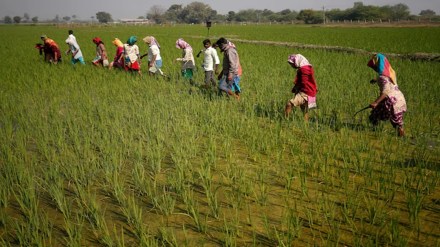By Naveen P Singh
India has emerged as a global leader in the production of paddy, wheat, and sugarcane, reflecting significant progress in its agricultural sector. However, disparities persist, particularly in resource-constrained regions where productivity in vital crops such as maize, soya bean, and cotton has either stagnated or declined. This underscores the urgent need for a systemic transformation of its agricultural research and extension system, pivotal for sustaining self-sufficiency, enhancing economic viability, and mitigating regional inequalities to leverage export potential.
The transition from a production-centric model to a demand-responsive agri-food ecosystem emphasising sustainability, inclusivity, and innovation is imperative. This article delineates a reform-oriented road map to reinvigorate agricultural research for achieving the Viksit Bharat 2047 vision, by harnessing India’s agricultural diversity and learning from international best practices.
Agriculture remains a cornerstone of India’s economy, employing nearly half of the workforce and contributing 18% to the GDP. However, it is plagued by structural challenges, including fragmented landholdings, unsustainable resource use, and environmental degradation. With 85% of landowners classified as small holders, their contribution to agri-output remains disproportionately low at 20%, primarily due to constrained access to technology, finance, and knowledge systems.
One of the sector’s most critical challenges is the over-extraction of groundwater, particularly in Punjab and Haryana. Over 50% of Punjab’s blocks are classified as over-exploited, and nearly 96% of Haryana’s in critical condition. Soil degradation, affecting 30% of India’s arable land, poses significant threats through erosion, salinisation, and fertility loss. The impact of climate change is exacerbating these vulnerabilities — the Intergovernmental Panel on Climate Change projects that rising temperatures and erratic rainfall could reduce crop yields by 10-20% by 2050.
While India has achieved remarkable production milestones, the plateauing of gains from the Green Revolution necessitates the adoption of adaptive and market-responsive strategies. The Indian Council of Agricultural Research (ICAR), central to advancements, must address operational inefficiencies and strengthen coordination to meet demands. Hence, to revitalise India’s agricultural research system, the following reforms are envisioned:
Boosting investment and aligning research with regional diversity: India’s agricultural research investment, at a modest 0.4% of GDP, lags behind global benchmarks such as China and the Netherlands, which allocate 1-2%. Substantial funding increases are needed to develop cutting-edge infrastructure and foster innovation. Public-private partnerships can mobilise resources effectively by incentivising private sector participation through tax benefits.
Agro-climatic-centric research needs leveraging tools such as remote sensing, soil fertility mapping, and geospatial technologies. This can address India’s diverse agro-ecological conditions. Successful models in Japan and South Korea demonstrate the benefits of integrating indigenous agricultural practices and adoption of resilient crop varieties and technologies for realising food security vis-à-vis achieving sustainable development goals.
Collaboration and capacity building for agricultural innovation: Effective agricultural research necessitates collaboration among universities, private enterprises, farmers, agricultural institutions, and other stakeholders. Multidisciplinary teams addressing regional challenges, akin to South Korea’s precision agriculture initiatives, have enhanced productivity by 60% over three decades, which can serve as a model. Capacity-building programmes should prioritise training researchers, extension workers, and farmers in advanced practices tailored to local contexts. Lessons from Israel and Taiwan highlight the transformative potential of modern agricultural technologies and robust extension systems. Restructuring the All India Coordinated Research Projects to address state-specific challenges can ensure alignment with regional priorities.
Harnessing technology to transform agriculture: Technological integration offers transformative opportunities. Tools like drones, data analytics, and biotechnology can improve resource efficiency, develop climate-resilient crops, and enhance productivity. Targeted funding and supportive policies are vital to scale these innovations across India’s diverse agricultural landscape.
Strengthening extension services by integrating Krishi Vigyan Kendras with state agriculture departments, reforming them as “one-stop solution models” and leveraging digital platforms such as eNAM (National Agriculture Market) and mobile advisory apps can bridge the research-to-farm gap effectively. Rythu Bharosa Kendra of Andhra Pradesh and Raitha Sampark Kendras of Karnataka need to be replicated in other states as well.
Sustainability and governance: Research must prioritise sustainable practices, including organic farming, integrated pest management, and conservation agriculture to reduce input dependency and improve ecological balance. Experiences from Sweden and China underline the benefits of these practices in improving the soil health and resource efficiency.
Governance reforms within the ICAR are crucial. Empowering scientists, streamlining administrative processes, and introducing robust monitoring and evaluation systems inspired by the UK’s agricultural research frameworks can enhance institutional effectiveness. Quality assurance in seed systems and other agricultural inputs will further ensure systemic reliability and productivity.
Revitalising our agricultural research system demands a cohesive effort involving government agencies, research institutions, private enterprises, and farmers.
Through these reforms, India can lay the foundation for a resilient, inclusive and innovative-driven agricultural ecosystem aligned with the vision of Viksit Bharat 2047.
The writer is member (official), Commission for Agricultural Costs and Prices, Union ministry of agriculture and farmers welfare.
Disclaimer: Views expressed are personal and do not reflect the official position or policy of FinancialExpress.com. Reproducing this content without permission is prohibited.
\
